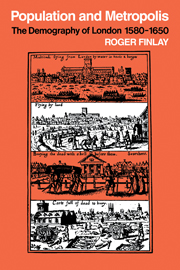Book contents
- Frontmatter
- Contents
- List of tables
- List of figures
- Preface
- 1 Introduction: The magnet of the metropolis
- 2 The accuracy of the London parish registers
- 3 The general growth of population in London
- 4 London social structure in 1638
- 5 The measurement of mortality rates
- 6 The effect of plague on mortality experience
- 7 Marriage and fertility
- 8 Population and metropolis
- Appendix 1 The London bills of mortality
- Appendix 2 Baptisms and burials in sample London parishes
- Appendix 3 Details from the 1638 listing and administrative divisions of London
- Appendix 4 London population in 1631 and houses in 1638 by wards
- References
- Index
2 - The accuracy of the London parish registers
Published online by Cambridge University Press: 06 July 2010
- Frontmatter
- Contents
- List of tables
- List of figures
- Preface
- 1 Introduction: The magnet of the metropolis
- 2 The accuracy of the London parish registers
- 3 The general growth of population in London
- 4 London social structure in 1638
- 5 The measurement of mortality rates
- 6 The effect of plague on mortality experience
- 7 Marriage and fertility
- 8 Population and metropolis
- Appendix 1 The London bills of mortality
- Appendix 2 Baptisms and burials in sample London parishes
- Appendix 3 Details from the 1638 listing and administrative divisions of London
- Appendix 4 London population in 1631 and houses in 1638 by wards
- References
- Index
Summary
Graunt's analysis of the London bills of mortality showed that the population of London would merit further study. However, conclusions based on the bills of mortality will always be open to question because it is not possible to verify the aggregate totals of baptisms and burials which are not subdivided by parish. A serious reconsideration of the parish registers in association with which the bills were compiled is thus called for. In a recent review of urban history during the early modern period, J. Patten (1978: 18) wrote that ‘until far more work is done on the direct evidence of parish registers, it will be hard to consider actual population dynamics and growth in detail and on any scale’. But it is often thought that the reliability of the London parish registers is doubtful. For example, I. Sutherland commented that ‘family reconstitution studies on the London parish registers do not appear to be a practical proposition’. He went on to explain his reasons for this view (1972: 310–11).
It seems unlikely that during the period under review all the burials came to the notice of the parish authorities, and that deficiencies, perhaps of the order of 10 per cent, will have occurred by omissions either from parish registers or the bills of mortality. The deficiencies in christenings before the Civil War will certainly have been greater than those in burials.
It is evident that if the London parish registers are to be used for population studies, their reliability must be assessed.
- Type
- Chapter
- Information
- Population and MetropolisThe Demography of London 1580–1650, pp. 20 - 50Publisher: Cambridge University PressPrint publication year: 1981



